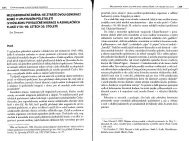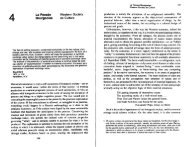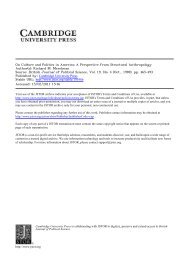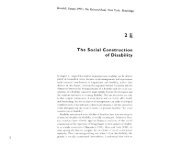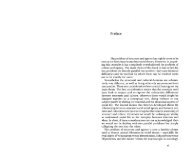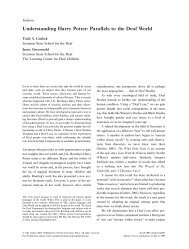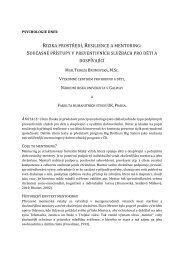Culture and Practical Reason Two Paradigms of ... - Moodle
Culture and Practical Reason Two Paradigms of ... - Moodle
Culture and Practical Reason Two Paradigms of ... - Moodle
- No tags were found...
You also want an ePaper? Increase the reach of your titles
YUMPU automatically turns print PDFs into web optimized ePapers that Google loves.
Chapter <strong>Two</strong> 72 Cuhure <strong>and</strong> <strong>Practical</strong> <strong>Reason</strong><strong>Two</strong> <strong>Paradigms</strong> <strong>of</strong> Anthropological Theory73in speech. But the continuity <strong>of</strong> custom is always vulnerable to disruption,if only by the comparison with other ways or in the socialization <strong>of</strong> theyoung. Custom, therefore, becomes an object <strong>of</strong>contemplation as well as asource there<strong>of</strong>, <strong>and</strong> to a conventional reason which remains unexpressedwe give a conventional expression which seems only reasonable. Thecultural logic reappears then in mystified form-as ideology. No longer asa principle <strong>of</strong>classification but in satisfaction <strong>of</strong> a dem<strong>and</strong> for justification.No longer, then, as arbitrary in relation to an objective reality but asmotivated by the cultural reality.The implications <strong>of</strong> this underst<strong>and</strong>ing for the anthropological projectare still unresolved; in some respects they are not yet realized. On oneh<strong>and</strong>, how much <strong>of</strong> what we take as essential institutions <strong>and</strong> beliefs shouldbe analyzed as folk etymology? Conversely, it no longer seems possible toshare Boas's optimism concerning anthropological categories, that bysome sustained positivist operation opposite to the formation <strong>of</strong> the ideas<strong>and</strong> customs to which they refer, they could indeed be "derived from,consistent with, <strong>and</strong> in a sense internal to, the phenomena themselves"(Stocking 1974, p. 4). In any event, the commentary on Morgan'srationalist analysis implied by the notion <strong>of</strong> secondary consciousnesswould not be difficult to develop. If "the origin <strong>of</strong> customs <strong>of</strong> primitiveman must not be looked for in rational processes," as Boas wrote (1965[1938], p. 215), still the origin <strong>of</strong> certain rational processes might belooked for in custom. The reasonableness <strong>of</strong> institutions, <strong>and</strong> above alltheir utility, is the principled way we explain ourselves to ourselves. Rationalityis our rationalization. Boas gives the telling example <strong>of</strong> the incesttabu, which once we were content to ascribe to religious reasons, but now"a utilitarian concept, the fear <strong>of</strong> unhealthy <strong>of</strong>fspring owing to the intermarriage<strong>of</strong> close relatives, is brought forward as the reason for our feelings"(1965 [1938], p. 208).'5The point is that when we render the conventional as the useful, it also15. The famous case is the origin <strong>of</strong> table manners: "The example <strong>of</strong> table manners givesal~ a fairly good instance <strong>of</strong> secondary explanation. It is not customary to bring thekmfe to the mouth, <strong>and</strong> very readily the feeling arises, that the knife is not used in thismanner because in eating thus one would easily cut the lips. The lateness <strong>of</strong> the invention<strong>of</strong> the fork, <strong>and</strong> the fact that in many countries dull knives are used <strong>and</strong> that asimilar danger exists <strong>of</strong> pricking the tongue or the lips with the sharp-pointed steel fork·which is commonly used in Europe, show readily that this explanation is only a secondaryrationalistic attempt to explain a custom that otherwise would remain unexplained"(Boas 1965 (1938), p. 65).becomes for us "natural," in the double sense <strong>of</strong> inherent in nature <strong>and</strong>normal in culture. Hence. Morgan, who made <strong>of</strong> this contradiction anethnological theory-the status <strong>of</strong> which might be then described as theappropriation <strong>of</strong> the meaningful realities <strong>of</strong> other peoples' lives by thesecondary rationalizations <strong>of</strong> our own.Anthropological Varieties <strong>of</strong> <strong>Practical</strong> <strong>Reason</strong>First announced in the work <strong>of</strong> Morgan <strong>and</strong> Boas, the founding disagreementover the nature <strong>of</strong> the anthropological object continues to assert itselfeven today across all manner <strong>of</strong>other theoretical controversies. This is notto underestimate the portent <strong>of</strong> such famous antinomies as "history/science," "culture/society," "diachrony/synchrony." But if these oppositionssucceeded in generating a development from one theoretical momentto the next, it was only to reproduce at each stage the unresolved contradictionat the base. In the upshot, the later perspectives which appear to marktheoretical ruptures find themselves internally at odds along the same linesthat separate the Morganian view from the Boasian. One functionalism isthis way distinguished from another, as also one historicism from another,<strong>and</strong> a moiety <strong>of</strong> functionalists or evolutionists finds an unlikely ally in thetribe <strong>of</strong> the other. Is it so paradoxical to group certain theoretical emphases<strong>of</strong> Levi-Strauss <strong>and</strong> Leslie White? (see below, p. 103) The agreement onprinciples between the archevolutionist Morgan <strong>and</strong> the archfunctionalistMalinowski is much more complete.Malinowski <strong>and</strong> "Ne<strong>of</strong>unctionalism"Even more explicitly than Morgan, Malinowski considered culture theinstrumental realization <strong>of</strong> biological necessities: constructed out <strong>of</strong> practicalaction <strong>and</strong> interest, as guided by a kind <strong>of</strong> superrationality-to whichlanguage <strong>of</strong>fers only the interest <strong>of</strong> a technical support (cf. Leach 1957).We must take our st<strong>and</strong>, Malinowski wrote, on two axioms: "First <strong>and</strong>foremost, that every culture must satisfy the biological system <strong>of</strong> needs,such as those dictated by metabolism, reproduction, the physiological conditions<strong>of</strong> temperature." And second, "that every cultural achievementthat implies the use <strong>of</strong> artifacts <strong>and</strong> symbolism is an instrumental enhancement<strong>of</strong> human anatomy, <strong>and</strong> refers directly or indirectly to the satisfaction<strong>of</strong> a bodily need" (Malinowski 1960 [1944], p. 171). To borrow a phrasefrom the French sociologist Baudrillard, it is as if culture were a sustainedmetaphor on the biological functions <strong>of</strong> digestion. In the last analysis,



